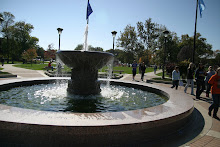By Michael Baumann
“All of these are implications for the future of Marian, leading to the question: Who are we?”
By “these,” professor of Sociology Dr. William Mirola meant tidbits gleaned from conversations the university at large has had about education and how the university may start revamping its image as an academic institution.
Mirola teaches SOC 380A, a special topics course entitled Social Class & Higher Education. The course, he said, was inspired in part by a book, “Academically Adrift: Limited Learning on College Campuses,” which observes how recently colleges and universities are pumping out more undergrads than ever, but not necessarily with the highest quality degrees and education.
The book was written by two sociology professors, Richard Arum and Josipa Roska who collected data from about 2300 students at 24 colleges and universities ranging the spectrum.
“The earth shattering thing (in the book) was that reading and writing were radically associated with higher performances—much more than originally believed,” said Mirola. The book asserts that students will perform better if they write 20 papers a semester and read 40 pages a week.
The student research involves a survey conducted to examine the academic experiences of students at Marian, considering background, family, and education history.
“This (survey) is going to tap into various kinds of social differences and how they affect education,” said Mirola.
“It’s a massive survey,” he said. 145 senior seminar students, about 200 COL 111 students, and 265 juniors and seniors in the Humanities courses—about 600 students overall took the 12 page, 62 question survey.
With the data, students will write about a self-designated research topic, including academic performance, parent education and effects, religious differences, stress levels, high school background, and class dynamics.
Mirola feels that Marian is a good place to research because “the case of Marian has so many aspects intersecting it.”
Mirola hopes to discover interesting and important information about Marian’s academia that will become part of a greater conversation of accreditation and self-articulation for Marian’s academic image.
For example, relationships between socioeconomic status and a liberal arts versus professional fields institution impact enrollment.
“There is an association between students with good backgrounds who view an undergrad as just a stepping stone to a real job,” said Mirola.
In short, high income families typically don’t want to see Big BEN—Business, Education, and Nursing—and Marian looks like it only offers those majors. They pass right over Marian—downplaying the other facets of Marian’s academia. Ultimately, enrollment suffers.
According to Mirola, “How we emphasize (other degrees) when Marian’s identity is a school that produces nurses and teachers could simply be off the radar of high SES families whose interests are in other areas.
“A class—upper, middle, lower—comes looking for a particular culture that’s familiar to them. They don’t ‘think’ of Marian in those terms.”
Mirola hopes the results of the survey will help Marian articulate for itself and for the community what it has to offer.
The SOC 380A class conducted all surveys and will record the data. A summary report should be ready by the end of the semester.
skip to main |
skip to sidebar

The Knight Times is a student newspaper dedicated to serving the Marian University student community. Our goal is to inform the Marian community on campus, local, and global issues. We strive to report the stories that matter and take student opinions and comments into consideration. We want you to read, comment, and enjoy!
Welcome to

- The Knight Times
- The Knight Times is a student newspaper dedicated to communicating campus, local, and global issues to the Marian University student community. We want you to read, comment and enjoy!
Photos Taken By:
Michael Schrader
David Leszcynski
Michael Schrader
David Leszcynski
Blog Archive
-
▼
2011
(20)
-
▼
October
(12)
- Happy Halloween!
- Campus Events!
- Raising the scholastic bar: an investigation into ...
- MU basketball to open by facing IUPUI
- Learning about learning: SOC 380A surveys students
- SGMU updates
- Where did Civic Theater go?
- Students tour historic Irvington... Ghost tour, th...
- By Michael SchraderIn mid-October, after the groun...
- The Knight Times learns more about Marian's new at...
- IgKnighted #1
- IgKnighted #2
-
▼
October
(12)
Stay Tuned for our NEXT Issue...
February 24 2012